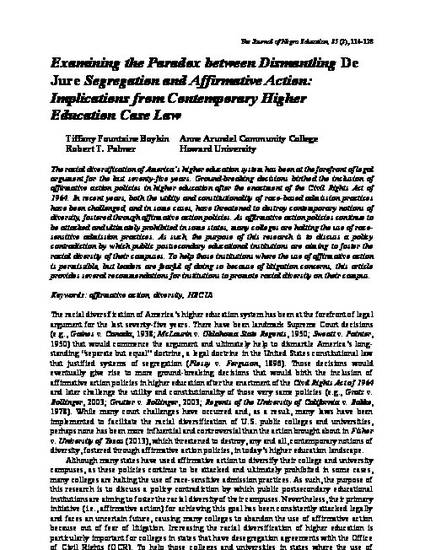
Article
Examining the Paradox between Dismantling De Jure Segregation and Affirmative Action: Implications from Contemporary Higher Education Case Law
Journal of Negro Education
(2016)
Abstract
The racial diversification of America’s higher education system has been at the forefront of legal argument for the last seventy-five years. Ground-breaking decisions birthed the inclusion of affirmative action policies in higher education after the enactment of the Civil Rights Act of 1964. In recent years, both the utility and constitutionality of race-based admission practices have been challenged, and in some cases, have threatened to destroy contemporary notions of diversity, fostered through affirmative action policies. As affirmative action policies continue to be attacked and ultimately prohibited in some states, many colleges are halting the use of racesensitive admission practices. As such, the purpose of this research is to discuss a policy contradiction by which public postsecondary educational institutions are aiming to foster the racial diversity of their campuses. To help those institutions where the use of affirmative action is permissible, but leaders are fearful of doing so because of litigation concerns, this article provides several recommendations for institutions to promote racial diversity on their campus.
Disciplines
- Education,
- Higher Education and
- Law
Publication Date
Spring April 18, 2016
Citation Information
Robert T. Palmer and Tiffany Boykin-Fountaine, PhD. "Examining the Paradox between Dismantling De Jure Segregation and Affirmative Action: Implications from Contemporary Higher Education Case Law" Journal of Negro Education Vol. 85 Iss. 2 (2016) p. 114 - 128 Available at: http://works.bepress.com/robert_palmer/82/
